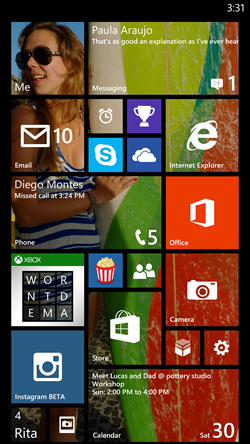
BlackBerry was a brand of smartphones and other related mobile services and devices. The line was originally developed and maintained by the Canadian company BlackBerry Limited from 1999 to 2016, after which it was licensed to various companies.
Sony Mobile Communications Inc. was a multinational telecommunications company founded on October 1, 2001, as a joint venture between Sony Corporation and Ericsson. It was originally incorporated as Sony Ericsson Mobile Communications, and headquartered in London, England, until Sony acquired Ericsson's share in the venture on February 16, 2012. On April 1, 2021, Sony integrated its electronics businesses including Sony Mobile into one company called Sony Corporation.

A mobile game is a video game that is typically played on a mobile phone. The term also refers to all games that are played on any portable device, including from mobile phone, tablet, PDA to handheld game console, portable media player or graphing calculator, with and without network availability. The earliest known game on a mobile phone was a Tetris variant on the Hagenuk MT-2000 device from 1994.
Mobile app development is the act or process by which a mobile app is developed for one or more mobile devices, which can include personal digital assistants (PDA), enterprise digital assistants (EDA), or mobile phones. Such software applications are specifically designed to run on mobile devices, taking numerous hardware constraints into consideration. Common constraints include CPU architecture and speeds, available memory (RAM), limited data storage capacities, and considerable variation in displays and input methods. These applications can be pre-installed on phones during manufacturing or delivered as web applications, using server-side or client-side processing to provide an "application-like" experience within a web browser.

Zune was a brand of digital media products and services that was marketed by Microsoft from November 2006 until it was discontinued in June 2012. Zune consisted of a line of portable media players, a music subscription service known as Zune Music Pass plus Zune Marketplace for music, TV and movies, streaming services for the Xbox 360 game console, and the Zune software media player for Windows PCs which also acted as desktop sync software for Windows Phone.

Bing for mobile is a search tool for handheld mobile devices from Microsoft as part of their Bing search engine. It is designed for mobile device displays. Bing Mobile is built into Windows Mobile and Windows Phone as proprietary software, accessed via the Search key on Windows Phone 7 and Windows Phone 8 devices. It is also available on Windows Phone 8.1, and can be downloaded for other platforms, including and Android.
Keek was a free online social networking service that allowed its users to upload video status updates, which were called "keeks". Users could post keeks to the Keek website using a webcam or via the Keek mobile apps for iPhone, Windows Phone, BlackBerry, or Android. Users could also reply back with text or video comments, known as "keekbacks", and share content to other major social media networks. There was also an embed option so users could embed their keeks into a blog or website.
Monsoon Multimedia was a company that manufactured, developed and sold video streaming and place-shifting devices that allowed consumers to view and control live television on PCs connected to a local (home) network or remotely from a broadband-connected PC or mobile phone. It was one of 5 major transformations initiated by Prabhat Jain, a Silicon Valley entrepreneur with 5 undergraduate and post graduate engineering degrees from Cal Berkeley and Univ of Vienna, Austria. On the even of Cisco acquiring Monsoon in 2017, EchoStar, the new parent of Sling sued Monsoon for patent infringement, having obtained confidential information about the date of the acquisition by Cisco from a Monsoon employee under murky circumstances. Monsoon settled the lawsuit by agreeing not to sell its products in the USA simply because it did not have the legal funds to fight mighty Echostar's legal maneuvers. EchoStar thus successfully removed its only competitor from the market place. This meant Monsoon's death knell.

Ovi by Nokia was the brand for Nokia's Internet services. The Ovi services could be used from a mobile device, computer or via the web. Nokia focused on five key service areas: Games, Maps, Media, Messaging and Music. Nokia's aim with Ovi was to include third party developers, such as operators and third-party services like Yahoo's Flickr photo site. With the announcement of Ovi Maps Player API, Nokia started to evolve their services into a platform, enabling third parties to make use of Nokia's Ovi services.
A mobile operating system is an operating system used for smartphones, tablets, smartwatches, smartglasses, or other non-laptop personal mobile computing devices. While computers such as typical/mobile laptops are "mobile", the operating systems used on them are generally not considered mobile, as they were originally designed for desktop computers that historically did not have or need specific mobile features. This line distinguishing mobile and other forms has become blurred in recent years, due to the fact that newer devices have become smaller and more mobile unlike hardware of the past. Key notabilities blurring this line are the introduction of tablet computers, light laptops, and the hybridization of the two in 2-in-1 PCs.

Windows Phone (WP) is a discontinued mobile operating system developed by Microsoft for smartphones as the replacement successor to Windows Mobile and Zune. Windows Phone featured a new user interface derived from the Metro design language. Unlike Windows Mobile, it was primarily aimed at the consumer market rather than the enterprise market.
Sideloading describes the process of transferring files between two local devices, in particular between a personal computer and a mobile device such as a mobile phone, smartphone, PDA, tablet, portable media player or e-reader.

Amazon Appstore is an app store for Android-compatible platforms operated by Amazon.com Services, LLC, a subsidiary of Amazon.
An app store, also called an app marketplace or app catalog, is a type of digital distribution platform for computer software called applications, often in a mobile context. Apps provide a specific set of functions which, by definition, do not include the running of the computer itself. Complex software designed for use on a personal computer, for example, may have a related app designed for use on a mobile device. Today apps are normally designed to run on a specific operating system—such as the contemporary iOS, macOS, Windows, Linux or Android—but in the past mobile carriers had their own portals for apps and related media content.
A mobile application or app is a computer program or software application designed to run on a mobile device such as a phone, tablet, or watch. Mobile applications often stand in contrast to desktop applications which are designed to run on desktop computers, and web applications which run in mobile web browsers rather than directly on the mobile device.

The Texas Hold’em King franchise is a series of games for mobile devices based on the popular version of poker, Texas Hold 'em. Developed by Ottawa-based Magmic Games, the titles have been ported to a number of devices all leading to the latest version with varied features taking one version a step up from the last.
Microsoft mobile services are a set of proprietary mobile services created specifically for mobile devices; they are typically offered through mobile applications and mobile browser for Windows Phone platforms, BREW, and Java. Microsoft's mobile services are typically connected with a Microsoft account and often come preinstalled on Microsoft's own mobile operating systems while they are offered via various means for other platforms. Microsoft started to develop for mobile computing platforms with the launch of Windows CE in 1996 and later added Microsoft's Pocket Office suite to their Handheld PC line of PDAs in April 2000. From December 2014 to June 2015, Microsoft made a number of corporate acquisitions, buying several of the top applications listed in Google Play and the App Store including Acompli, Sunrise Calendar, Datazen, Wunderlist, Echo Notification Lockscreen, and MileIQ.
Opera Mobile Store was a platform-independent browser-based app store for mobile-phone owners and a digital application distribution platform used by more than 40,000 developers. It is owned and maintained by Opera. Launched by a third-party provider in March 2011, the Opera Mobile Store was relaunched on a new platform, after acquisition of Handster, a mobile app store platform company, in January 2012. The service allows users to browse and download applications for over 7,500 different devices on Android, Java, BlackBerry OS, Symbian, iOS, and Windows Mobile.

The popularisation of mobile games began as early as 1997 with the introduction of Snake preloaded on Nokia feature phones, demonstrating the practicality of games on these devices. Several mobile device manufacturers included preloaded games in the wake of Snake's success. In 1999, the introduction of the i-mode service in Japan allowed a wide variety of more advanced mobile games to be downloaded onto smartphones, though the service was largely limited to Japan. By the early 2000s, the technical specifications of Western handsets had also matured to the point where downloadable applications could be supported, but mainstream adoption continued to be hampered by market fragmentation between different devices, operating environments, and distributors.









